Tag: HVAC technician courses
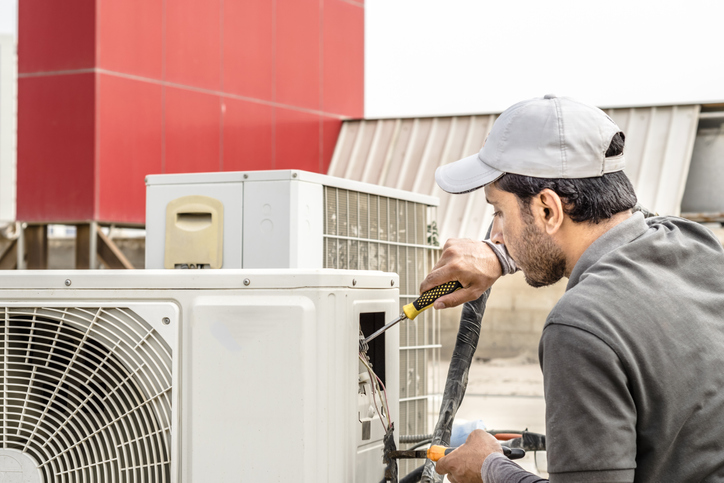
If you enjoy working with your hands and like the idea of servicing heating, ventilation or air conditioning systems, then a career in the HVAC industry is the right choice for you. You’ll apply your hands-on training and practical skills towards a successful and dynamic career. But in order to do so, it’s a good idea to understand what a typical day is like working in the industry.
At NATS, we prepare you for the daily job expectations you will encounter throughout your career. You’ll learn the installation and maintenance of gas and propane heating systems, ventilation and air-cooling equipment for both residential and commercial buildings.
Read on to discover what a day in the life of an HVAC technician is like!
The Work Schedule for an HVAC Technician Depends on the Setting
Whether you enjoy working on a consistent schedule or with on-call shifts, jobs in the HVAC industry offer something for everyone. Your work schedule will depend on your form of employment. When you become an HVAC technician after completing your training from NATS, you’ll get the chance to work for a home building, a commercial business or a construction company. This may give you the opportunity to work regular business hours, on a fixed schedule, or simply when your expertise is needed to troubleshoot issues.
The Start of Your Day Can Vary
After you complete your HVAC technician courses from NATS and start your career in the industry, you’ll realize how dynamic your workday can be. When you work in the HVAC industry, you’ll start your day by going into work and checking the pending tasks that require your attention. You’ll then have to use your organizational skills to manage your schedule and arrange the time to attend to these tasks based on importance.
On the other hand, if you want to become a self-employed contractor, then your day will begin by checking emails or voice messages and answering phone calls from customers requiring your services. No matter how your day starts, you should be prepared to carry your safety gear and tools and start heading over to the locations that require your services.

Prepare Yourself for Different Working Conditions
Working in the HVAC industry allows you to experience different working conditions and different settings. With professional training from NATS, you’ll be prepared to handle the different issues that you may face throughout your career. More specifically, you’ll learn how to check airflow, refrigerant pressure, electrical circuits, burners and other components for various clients. You’ll also be prepared to work safely and efficiently in more challenging work conditions, such as extreme temperatures.
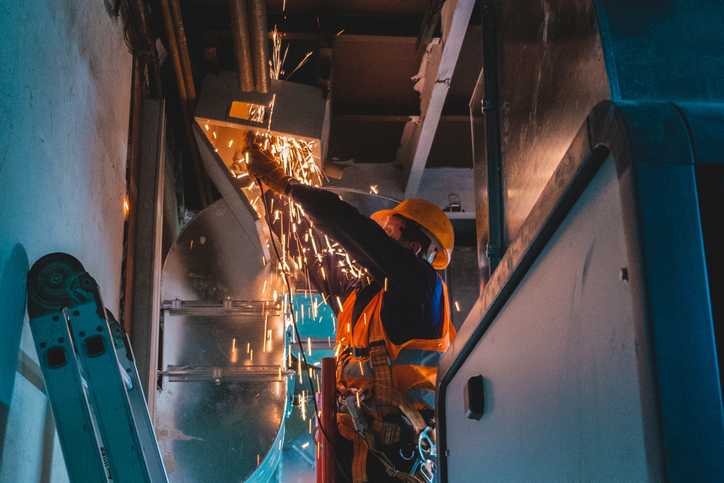
For example, you may have to repair broken furnaces in the middle of winter, when temperatures drop significantly, or repair the air conditioning of a residential or commercial building. Since no one task is the same, you’ll find an exciting and engaging career that puts your skills to the test on a daily basis.
Interested in HVAC school?
Contact NATS for more information!
Considering HVAC School? 4 Advantages to Choosing a Career as an HVAC Technician
November 02, 2021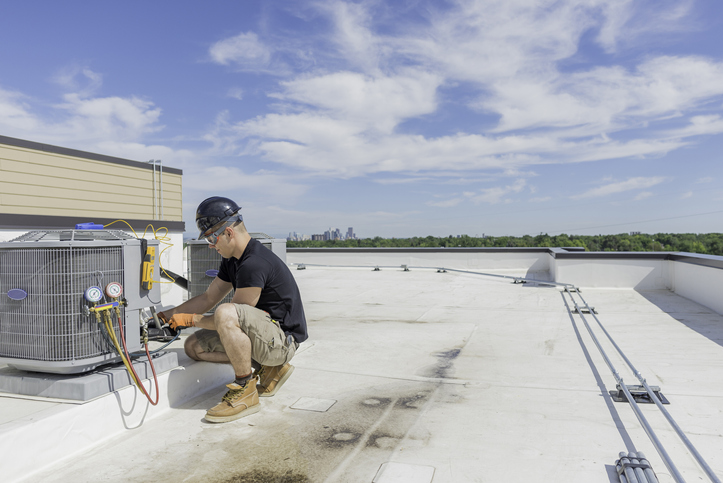
HVAC technicians are experts in HVAC (heating, ventilation, and air conditioning) systems, conducting installations, repairs, routine maintenance, and more. They may work with commercial, residential or industrial air conditioning systems, refrigeration systems–as well as systems of combined heating, ventilation, and cooling. After completing your HVAC training, you’ll be able to perform a range of duties, including the assembly and installation of different system components (vales, gauges, condensers, compressors, evaporators, etc.), and troubleshooting of HVAC systems to identify leaks or other issues. You’ll also perform maintenance tasks such as parts replacement, system calibration, and refrigerant refills.
If you’re considering a career as an HVAC technician, you might just be ready to start your training after learning about the advantages of this career path. Below, discover four of them!
1. HVAC School Graduates are In-Demand in Ontario
If you’re considering HVAC school, there’s never been a better time to enrol. According to JobBank Canada, job opportunities for HVAC technicians in Ontario will be good over the next three years, as retirements create new availability and employment growth creates new opportunities for work. Ontario’s construction industry is growing, and HVAC technicians will be needed to install and maintain the commercial and residential systems for each new structure. Thanks to investments in public facilities and commercial developments, HVAC technicians may also be able to find work supporting industrial projects.
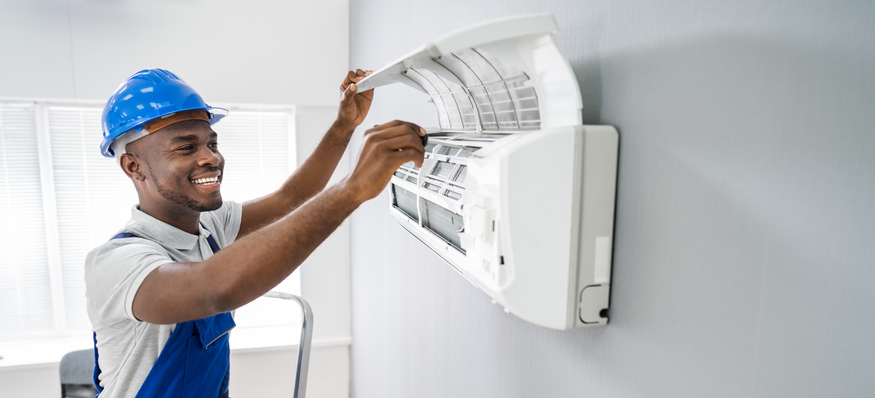
2. HVAC Technicians Benefit from a Dynamic Career
As an HVAC technician, your job will never be boring. HVAC technicians benefit from the ability to perform many different kinds of work throughout their career, depending on their interests and whether they choose to specialize in a particular sector of the HVAC industry. HVAC technicians may work with fireplaces, furnaces, pool heaters, heat pumps, boilers, and refrigeration systems. What’s more, there are many advancements in technology making the work of HVAC technicians increasingly interesting. Smartphone-controlled heating and cooling systems, solar-powered air conditioners, and other innovations are continuing to shape the industry, promising an exciting future for HVAC technicians.
3. Grads of HVAC College Are More Active
Once you become an HVAC technician, you might be surprised by the benefits of the work to your physical health. Graduates of HVAC college have a highly active job, working both indoors and outdoors and travelling between different project locations. Rather than sitting around at a desk all day, you’ll be earning all the health benefits of a job where you’re constantly moving, such as a reduced risk of cancer and reduced risk of heart disease.
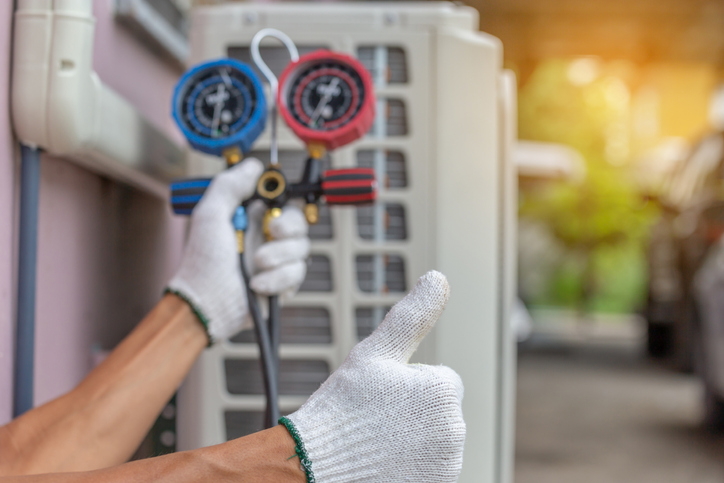
4. As an HVAC Technician, You Have Many Work Opportunities
Once you become an HVAC technician, you don’t need to be restrained by a strict work schedule or an unvaried work environment. In fact, there are many different opportunities for work within the HVAC industry. As a technician in this trade, you may be employed by an HVAC system installation contractor, and you may also find work in different industrial settings, such as: engineering firms, retail, food wholesalers, and other operations. Additionally, after gaining experience in the field, HVAC technicians may choose to open their own business, installing, repairing, and maintaining HVAC systems for various clients and creating their own schedule. If you’re looking to enter a field where you’ll never get bored, becoming an HVAC technician might be right for you.
Ready to enroll in HVAC technician courses?
Launch your career with a program at the North American Trades Schools today!
If You’re Enrolled in HVAC Technician Courses, Discover 5 Signs of Low Refrigerant in a System
October 07, 2021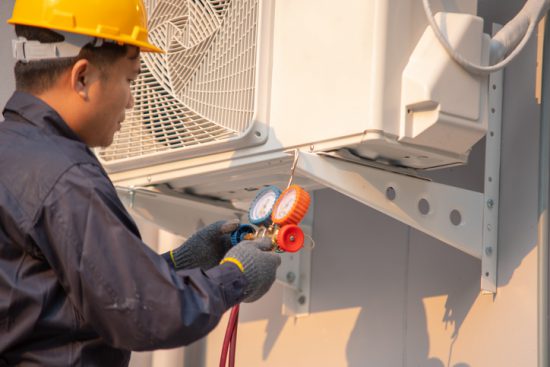
If you’re considering becoming an HVAC technician, you’ll be launching a career as an expert in the field of heating, ventilation, and air conditioning systems. Your expertise will enable you to perform services for clients such as installing HVAC systems, maintaining and repairing the systems, and troubleshooting problems within these systems. When servicing air conditioning systems during your career, one of the most common problems you may encounter is a low level of refrigerant within the system.
Refrigerant, a compound which absorbs heat from the surrounding environment, is essential to the smooth operation of an AC system. Within an AC system, refrigerant is stored inside copper coils–taking in heat from the air in a home or other indoor space. The refrigerant is then distributed through the condenser and compressor, where it is converted from liquid to gas to liquid. The resulting hot air is blown outside, while another fan blows air over the cold coils containing the refrigerant and into the building. Given the importance of refrigerant in the distribution of cold air, when refrigerant levels are low, an AC system’s performance will be negatively affected.
When refrigerant levels are low, it’s typically either due to a leak, or because the AC system was installed incorrectly. During your career as an HVAC technician, becoming familiar with the signs of low refrigerant in an AC system will help you to successfully identify and repair related issues before greater damage ensues. Below, discover five common signs of low refrigerant in an air conditioning system.
1. After HVAC College, Look Out for Longer Cooling Cycles
If a client complains that it’s taking a particularly long time to cool their home, low refrigerant levels could be at fault. With low refrigerant levels, the air being blown indoors is warmer than usual, meaning that the air conditioning system has to run longer cycles to match the thermostat-designated temperature. After HVAC school, check the refrigerant levels of an AC system if the cooling cycles seem unusually long.

2. The Refrigerant Lines Freeze
Low levels of refrigerant can also have a negative effect on the AC system’s refrigerant lines, or evaporator coil. The evaporator coil is responsible for taking hot air from the indoors and adding it to the refrigerant. However, when refrigerant levels are low, the evaporator coil will become too cold, leading to a buildup of ice. Typically, this ice will start to spread to other parts of the AC system, including its surrounding components.
3. The Energy Bills Go Up
When a client complaining of higher energy bills requests your services, the air conditioning system’s refrigerant levels will be one of the first things you’ll want to check. Due to the longer cooling cycles which are needed to cool a home, the air conditioning system is working much harder than it should be. Since harder work translates to a greater consumption of energy, always remember to check refrigerant levels when a client’s energy bill spikes.
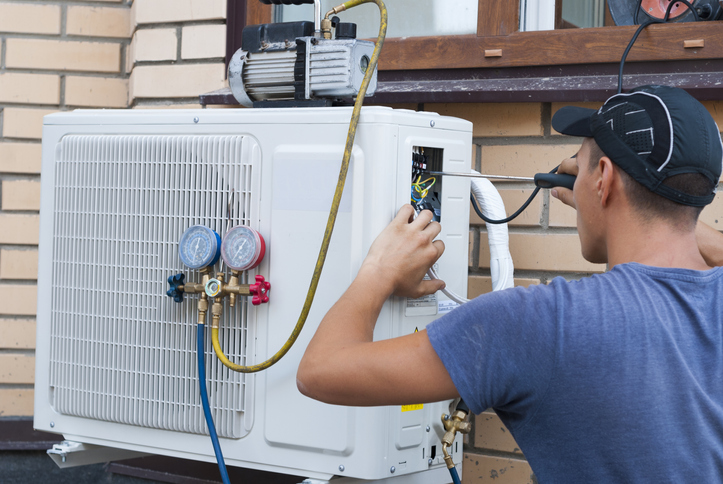
4. Lack of Cold Air
After HVAC college, it’s safe to suspect low refrigerant levels when an AC system isn’t blowing cold air. Because the cooling chamber contains more heat when refrigerant levels are low, it’s difficult for the system to adjust the temperature of the air it’s sending out. This causes the system to expel lukewarm rather than cool air–a problem which is more than inconvenient for those trying to keep their homes cool during the warmer months!
5. There’s a Hissing Noise
When refrigerant levels are low, one of the probable causes is a leak somewhere within the AC system. In the case of a leak, it’s likely that a hissing noise can be heard, indicating that refrigerant has escaped from the coils that contain it. The moment you hear a hissing sound coming from an air conditioner unit, check the refrigerant levels to ensure that there isn’t a hazardous leak.
Ready to enroll in HVAC technician courses?
Become an expert in HVAC systems with a program at the North American Trade Schools!
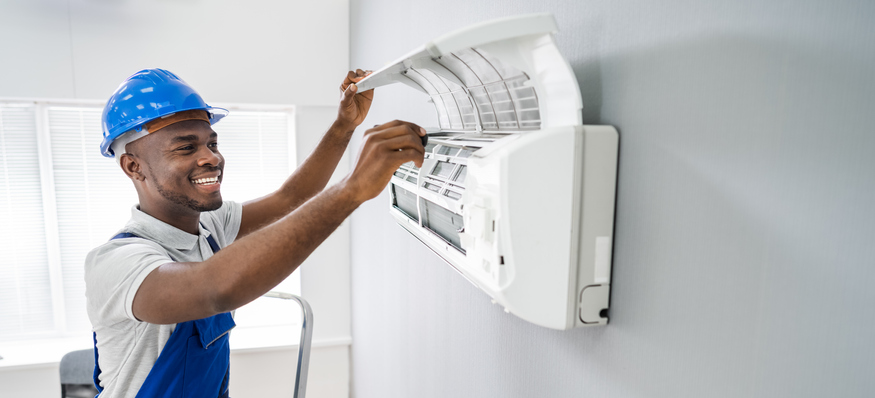
If you’re thinking about becoming an HVAC technician, you’ll be launching a rewarding and dynamic career within the heating, ventilation, and air conditioning industry. With the skills you possess, you’ll be able to provide essential services to clients–installing and maintaining both ventilation and air cooling equipment, as well as gas and propane heating systems. As an HVAC technician, not only will your technical skills be important, but so will your ability to interact with clients and provide quality, reliable service.
Below, explore some qualities that will help you to succeed in the HVAC industry, both during your training and throughout the rest of your career.
1. Graduates of HVAC College Are Good with People
If you have strong interpersonal skills, you’re off to a great start! HVAC technicians interact with many different customers on a daily basis. Therefore, an HVAC technician must be able to speak with a friendly demeanor, listen to any requests or concerns, and provide all necessary information in a patient and comprehensive manner. Once you graduate from HVAC college, your ability to communicate actively with customers will help you to establish trust and earn you even more clients through word of mouth recommendations. During your training, consider building interpersonal skills in order to succeed throughout your HVAC technician career.
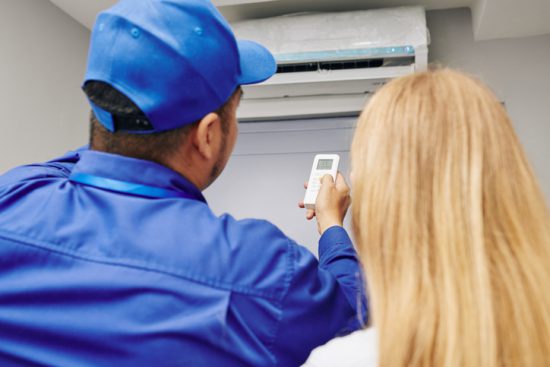
2. Successful Technicians Are Reliable
As an HVAC technician, clients are trusting you to perform a service for them. To gain their trust, you’ll not only want to possess the necessary skills and knowledge, but you’ll also need to provide reliable service. With this in mind, it’s important that HVAC technicians can prove to be extremely reliable, as this will help to enhance their reputation and establish customer loyalty. During your career, make sure to be on time to appointments, and notify customers if you’re running late or are unable to perform a requested installation or repair.
3. Attention to Detail Is a Quality Shared by HVAC Professionals
During HVAC school, you’ll learn about the importance of precision within the HVAC field. HVAC technicians must be able to use a number of tools and testing devices such as thermometers, pressure gauges, voltmeters, manometers, and more. With strong attention to detail, HVAC technicians can use these devices to measure and obtain information about electrical circuits, refrigerant pressure, air flow, and burners. As an HVAC technician, being attentive to detail will help you to accurately install and maintain the heating and ventilation systems you work with–ensuring that no mistakes are made due to incorrect information.
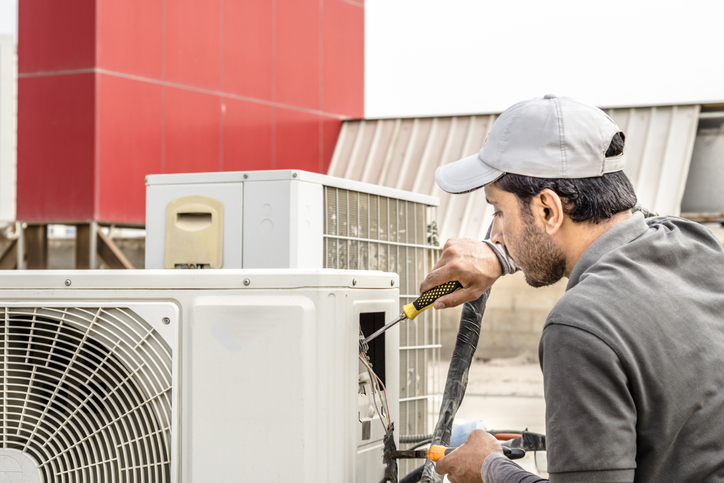
4. Preparedness Is an Essential Quality for HVAC Technicians
If you’re a highly organized person, you’ll excel in a career as an HVAC technician. These professionals must be prepared for a number of different appointments every day–showing up to each one equipped with the tools and equipment necessary to complete the job at hand. As an HVAC technician, preparation is key to being able to perform any installation or repair, as your ability to remember which parts and tools you need for specific tasks will ensure that you’re always providing a quality level of service.
5. A Good HVAC Technician Is Confident
There’s nothing more terrifying to a customer than an HVAC technician who seems unsure of their capabilities. As customers are trusting you to correctly install and repair the heating and ventilation systems they rely on, it’s important that you build the skills necessary to confidently address the needs of your clients. At the North American Trade Schools (NATS), you’ll receive hands-on training in the installation and maintenance of HVAC systems, equipping you with the knowledge to work confidently throughout your career. Consider training with NATS in order to launch a career as a capable and successful HVAC technician!
Ready to take HVAC technician courses?
Launch your career with a program at the North American Trade Schools today!
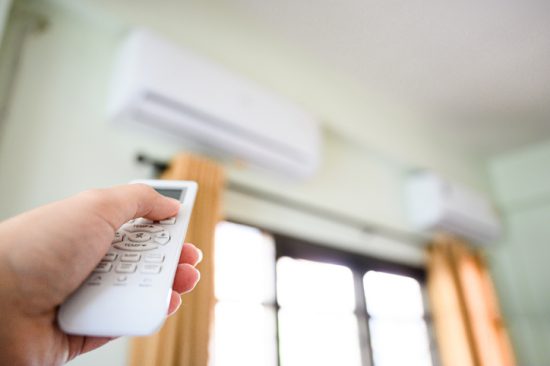
Sustainability is leading the conversation in most industries today. As with the majority of sectors in the construction and maintenance industry, the Heating, Ventilation, and Air Conditioning (HVAC) market is under pressure to go greener. Sustainable HVAC systems are an important innovation for both the industry and our planet. Homeowners and technical workers can benefit from new technologies that reduce the environmental impact of HVAC systems while maintaining their design integrity.
Students training for a career within the HVAC industry will study the installation and maintenance of different HVAC systems in residential and commercial environments. Gas codes and regulations are other important features of HVAC training. To get to grips with the evolving trends of the industry, read on for an overview of the benefits and concepts behind sustainable solutions in HVAC design.
The Benefits of Sustainable HVAC Systems
The drive to reduce energy consumption, greenhouse gases, and the use of fossil fuels are top concerns when it comes to sustainable design initiatives. Delivering hot water and heating to buildings produces a significant greenhouse gas footprint. Sustainable HVAC systems offer a solution to the environmental expense of traditional heating and cooling methods. HVAC systems such as heat pumps work by transferring heat between indoor and outdoor spaces to regulate the temperature of the building. In that sense, they are sustainable alternatives to boilers or furnaces that rely on fossil fuels.
Students in HVAC school might be interested to know that sustainable HVAC systems save both energy and costs in the long run. Up to 30 percent of the energy generated for use in commercial buildings is wasted. On average, HVAC systems last up to 15 years–a long time to endure high energy expenses and greenhouse gas emissions. Both workers and homeowners can benefit from the reduced cost of climate control over the building’s life cycle. It’s important for construction and maintenance technicians to know which sustainable technologies provide the best return over time.

Sustainable HVAC Solutions
There are numerous ways to achieve sustainability in HVAC systems. Thermal air conditioning is a great way to conserve energy without sacrificing power and comfort. Instead of relying on electricity, these units use solar panels to draw energy from their surroundings–an efficient and cost-effective solution.
Duct wrap is another staple of the HVAC industry that is used to reduce energy loss that can occur in air ducts. Unlike regular duct wrap, quiet duct wrap is made from recycled denim reduced from landfills. Quiet duct wraps also prevent irritants or other organic compounds from reducing indoor air quality.
The dual-fuel heat pump is a great solution that uses a combination of fuel types. The dual-fuel heat pump uses both electricity and gas to generate efficient heating and cooling. For homeowners who are concerned about the reliability and power of sustainable systems, the dual-fuel heat pump is one to count on. The pump uses electricity above 1.67 degrees Celsius, but if the temperature drops lower, the pump resorts to gas to heat the home. In that way, sustainable systems provide powerful solutions without compromising energy-efficient efforts.
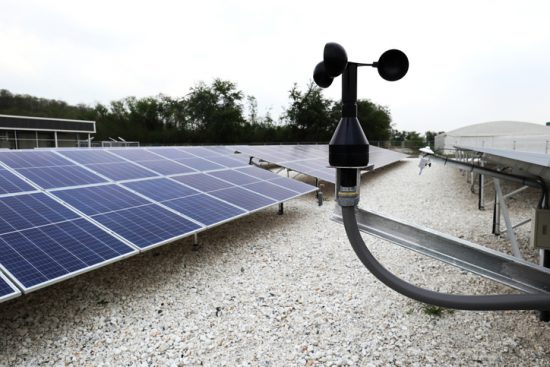
The Future of Sustainability for Those in HVAC College
Students in HVAC technician courses will work with numerous types of equipment to construct and maintain HVAC systems–including: measurement gauges, refrigerant lines, and air ducts. Voltmeters, thermometers, pressure gauges, and other testing devices are used to check airflow, refrigerant pressure, electrical circuits, and other components. Knowing how to apply these tools and materials to sustainable solutions is valuable to stay ahead of the industry. To become more sustainable, construction technicians should consider the bigger picture and think in terms of building integration. By choosing the right products, materials, and building designs, technicians can push for a more sustainable future for the construction industry.
Are you interested in attending HVAC college?
Contact NATS today to learn more about our program!

If you’re considering launching a career as an HVAC (heating, ventilation and air conditioning) technician, you’ll be entering an exciting field where your skills will be in-demand. On the job, your duties might include installing HVAC units, conducting routine maintenance examinations, replacing broken components, and more. Throughout your career, it’s important to prioritize your safety, as HVAC technicians are often exposed to hazardous materials and conditions while on the job. Chemicals such as refrigerants and contaminants–including dirt and debris–are all common to encounter as an HVAC technician. With this in mind, it becomes key to wear the proper safety gear to protect you from harm.
Read on to discover what you should have on hand to stay safe as an HVAC technician.
After Finishing HVAC College, Wear Protective Gear
As an HVAC technician, it’s important to wear clothing that protects you from exposure to both chemicals and contaminants. On the job, be sure to wear a long-sleeved shirt and long pants so as not to leave any skin vulnerable. Additionally, ensure that your clothing is free of synthetic fibers, as they’re more flammable. After graduating from HVAC school, it’s also important to wear the right boots, as proper footwear is necessary to protect your feet from the heavy machinery you’ll be working with. You’ll also need safety goggles to protect your eyes from debris, and earplugs to prevent hearing damage due to the power tools used in HVAC work. Lastly, a thick pair of gloves will keep your fingers safe from any injuries that could result from handling sharp wires or pipes.
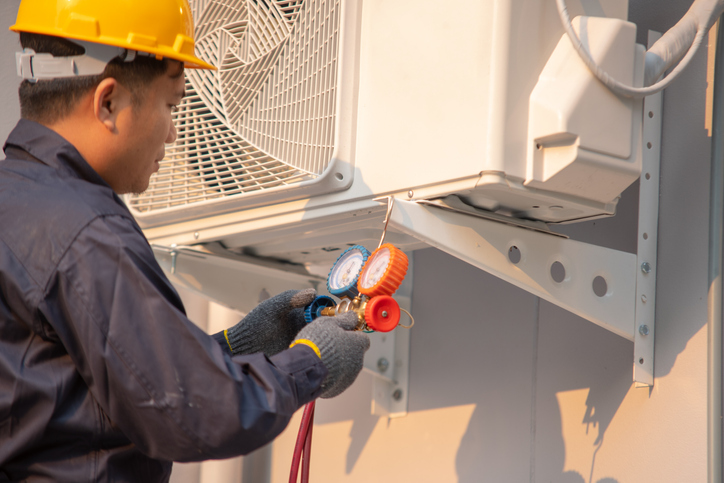
Use the Right Tools
When you use the right tools, your safety will be enhanced throughout your career. There are a few critical tools that enable you to perform any job in adherence with industry standards—reducing the risk of malfunctions that might otherwise pose a threat to your safety. As a graduate of HVAC college, you should always have the following tools in your bag:
- Clamp metre
- Anemometre
- Wrench
- Vacuum gauge
- Refrigerant leak detector
- Wire stripper
While it’s important to have these tools on hand, it’s important to examine the quality of your tools before beginning any repair or installation. By ensuring that your tools are in good working order, you’ll be able to avoid making any dangerous mistakes on the job.
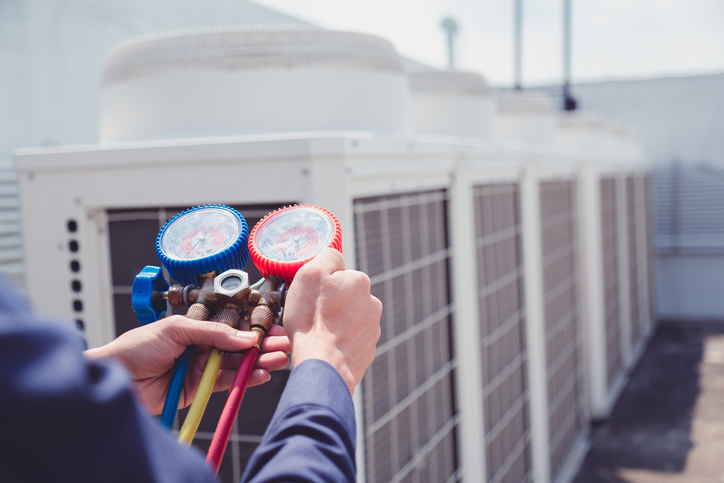
Follow these Practices When Handling Chemicals
Throughout your career as an HVAC technician, you’ll be working with and transporting many different chemicals. In addition to wearing the right safety gear, it’s also important to know how to handle chemicals on the job to reduce your risk of injury. When using gas cylinders, make sure to inspect them before filling them up, and check to make sure there are no signs of leaks or damage. You should also not have gas cylinders in your van in hot weather, as this can increase the risk of explosion. When working with any detergents, refrigerants, solvents, or other cleaning liquids, make sure to wear goggles and a protective mask over your face to avoid exposing yourself to chemicals.
With these safety rules in mind, you’ll be ready for a long career as an HVAC technician.
Thinking about enrolling in HVAC technician courses?
Launch your career with a program at the North American Trade Schools!
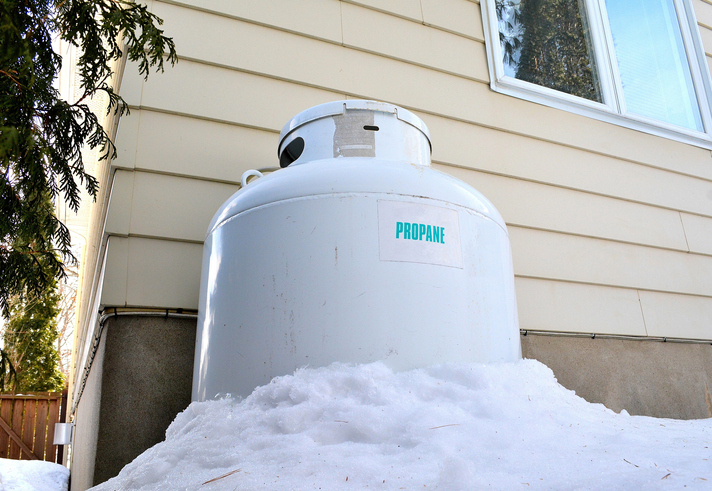 While propane isn’t the most commonly used source of energy for a home, its use has been growing in popularity in recent years. Propane is used to fuel both home-heating furnaces and water heaters. It is also beneficial due to the lower amount of greenhouse gas emissions it produces, as well as its potential as a less costly source of energy. In a propane heating system, propane is stored in a designated tank. This is fitted to a home’s gas line and then transferred to the furnace, which delivers heat to the rest of the home.
While propane isn’t the most commonly used source of energy for a home, its use has been growing in popularity in recent years. Propane is used to fuel both home-heating furnaces and water heaters. It is also beneficial due to the lower amount of greenhouse gas emissions it produces, as well as its potential as a less costly source of energy. In a propane heating system, propane is stored in a designated tank. This is fitted to a home’s gas line and then transferred to the furnace, which delivers heat to the rest of the home.
Propane is a convenient source of heat for a home, but it’s important to know how to maintain a propane heating system once it’s installed to ensure that it remains safe and effective. If you’re interested in a career as an HVAC technician, read on to discover three tips for maintaining a propane heating system.
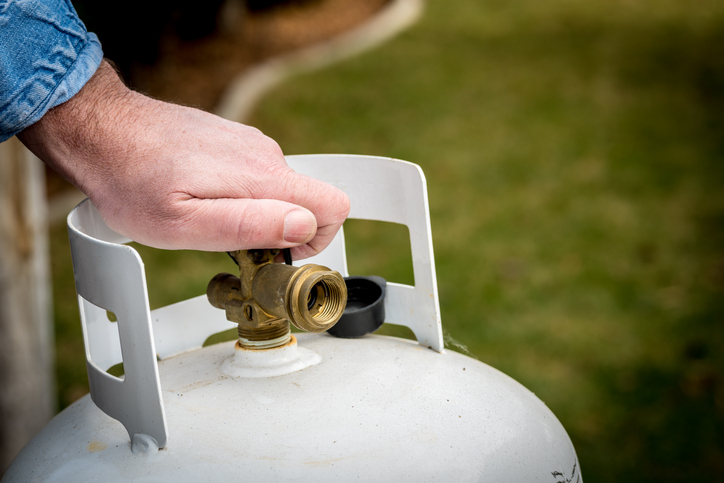
1. HVAC College Graduates Should Pay Attention to a Propane Heating System’s Pilot Light
Most propane heating systems operate through the use of a pilot light, which is a small flame that burns continuously. After HVAC school, it’s important to be familiar with how a propane heating system’s pilot light works in order to properly maintain these systems. In a propane heating system, the pilot light is located at the burner of the heating appliance that the propane fuel is being used for. The pilot light is also responsible for igniting the propane fuel to provide heat.
When maintaining a propane system, check the colour of the pilot light. A pilot light’s flame should be blue in colour. But if it appears to be orange or yellow, the pilot tube may need to be cleaned. Additionally, if the pilot light frequently extinguishes, this could signal a larger problem with the propane heating system. In this case, all connections and tubes should be examined to ensure that there isn’t a leak.
2. A Propane Heating System Needs Regular Service
One of the most important things to know about propane heating systems is that they may require more regular maintenance than other heating systems. A propane tank can be regularly serviced by checking the tank’s fuel gauge. When this gauge indicates that there’s less than 20% of fuel remaining, it’s time for a refill. Additionally, it’s important to examine the tank itself regularly by checking the tightness of the connecting pipes and ensuring that there are sufficient levels of pressure. Make sure that the area around the tank is clear of any forms of clutter. If there are flammable materials in close proximity of the tank, remove them in order to reduce the risk of fire.
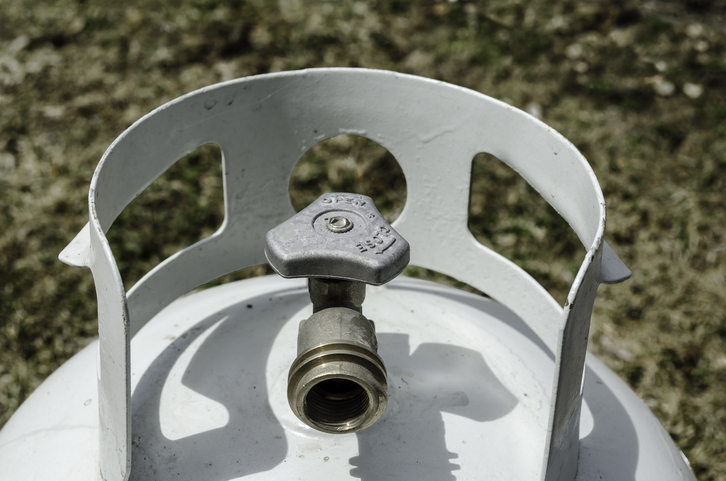
3. Take Measures to Prevent Leakage
While a propane leak is uncommon, graduates of HVAC technician courses should be proactive in preventing leakage. A propane leak can be extremely dangerous, as propane is flammable and can increase the risk of fire within a home. The chances of a leak in a propane system can be reduced by tightening and protecting the propane tank’s fittings. Where the gas line connects to the propane tank, ensure that the connection is properly sealed by using a wrench to tighten the connection. If a leak is suspected, the main gas valve should be turned off immediately in order to safely address the problem.
When properly maintained, propane systems can be an efficient source of heat for a client’s home. During your HVAC technician career, take the above steps to ensure that your client’s propane heating system is working safely and effectively.
Are you ready to enroll in HVAC college?
Get the training you need at the North American Trade Schools. Start exploring today!
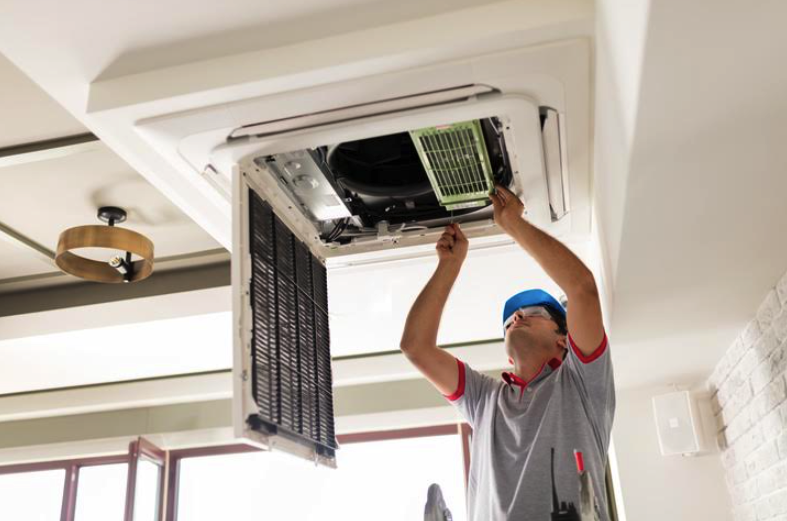 Working within the heating, ventilation, and air conditioning (HVAC) industry is a rewarding career path. However, it takes more than classroom learning to gain the confidence you need to feel comfortable on the job. In order to become successful in this field, it’s important that you also get hands-on training and experience.
Working within the heating, ventilation, and air conditioning (HVAC) industry is a rewarding career path. However, it takes more than classroom learning to gain the confidence you need to feel comfortable on the job. In order to become successful in this field, it’s important that you also get hands-on training and experience.
Being an HVAC technician is all about knowing how to diagnose a situation and use the correct tools and equipment to perform the task at hand–whether that’s installing, maintaining, or repairing a system. When choosing an HVAC program, make sure that you’re choosing one that offers hands-on training to equip you with the experience necessary to handle all kinds of situations.
Here’s more on why hands-on training is necessary for aspiring HVAC technicians.
Hands-On HVAC Technician Courses Promote Problem-Solving Skills
A good HVAC technician should be able to apply the knowledge they learn in the classroom to real-world situations, and be able to actively solve the problem at hand. The only way to get better at problem-solving on the job is to gain experience at an HVAC college–offering students the opportunity to participate in hands-on training. At North American Trade Schools (NATS), students receive hands-on training in the lab in addition to the information they learn in the classroom. They can expect to work with testing devices and various types of equipment. This helps them to gain first-hand experience with common problems encountered on the job.

Greater Retention of Information
Learning by doing has been proven to be a fool-proof way to remember information. When engaging in hands-on learning, students enrolled in HVAC technician training have the opportunity to familiarize themselves with common materials and equipment of the trade, and get to practice using these tools. Because they’re learning by doing with hands-on training, students are more likely to retain what they’ve experienced, and can easily access and apply that knowledge to situations on the job.
Students Will Gain Familiarity with Safety Protocols
Within this field, there are always risks and safety hazards that may be encountered. Working within the real-world environment offered through hands-on training gives students in HVAC technician courses the chance to practice following safety protocols, and allows them to better understand the risks that go along with the job.
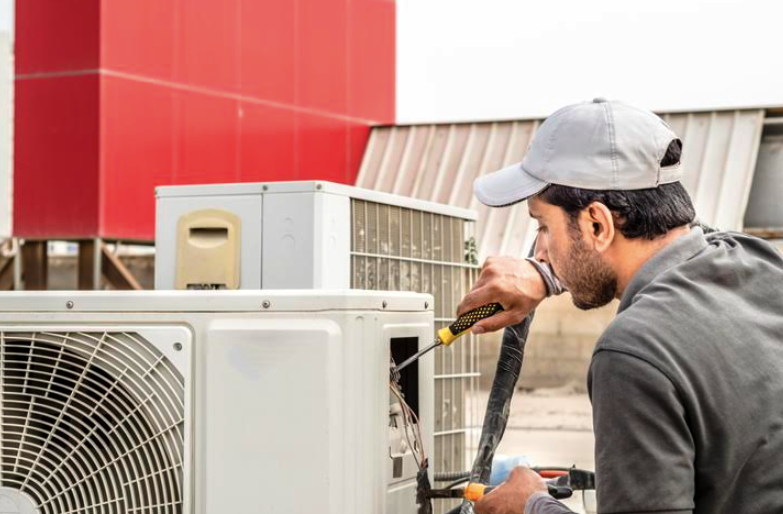
Get Training From Industry Experts
As an HVAC technician student, much of what you learn will depend on the advice and experience of others. It’s important to get hands-on training from experienced teachers in order to learn as much as possible about the field. At NATS, the instructors supervising your training are industry experts. Input from these seasoned professionals proved invaluable to NATS welding graduate Emily Harrison, who said her “favourite thing about the campus was the knowledge of the teachers and how much practical work you were able to do. It was very helpful.”
Receiving hands-on training from experienced instructors will ensure that all your questions are answered, making you that much more ready to tackle on-the-job challenges.
Are you interested in attending HVAC school to prepare you for this role with hands-on training?
Check out program options from North American Trade Schools today.

Since heat pumps are such a common tool in the heating, ventilation, and air conditioning (HVAC) industry, aspiring technicians should expect to become very familiar with them throughout their education and future career. Read on for an introduction to heat pumps to get you warmed up!
Learn How Heat Pumps Work With an HVAC Diploma
Heat pumps are not a new technology. In fact, the first heat pump was invented in 1948 by Robert C. Webber. Since then, the technology has been developed to resemble the air conditioning and heating units we have in our homes and offices today. HVAC technician courses will give you the opportunity to learn hands-on how this technology works.
Heat pumps can provide both heating and cooling services. In heating mode, heat is absorbed from outside by the condenser coil and transferred to the interior space via air vents. Even on cold winter days, heat pumps are able to collect warm air from outside. However, if there’s not enough warm air outside, heat pumps can use electric energy or an additional gas furnace to provide extra heat.

In air conditioning mode, the cycle is reversed. Warm air inside the house is pulled into the system with a motorized fan and transferred outside, usually behind or underneath the condenser coil. Cool and dehumidified air then enters the home through the air vents.
Heat Pumps are Energy Efficient
Eco-conscious homeowners will be relieved to discover that heat pumps are incredibly energy efficient. As you will learn in HVAC technician training, heat pumps generate 4 units of thermal energy per 1 unit of electricity used – that’s an efficiency rating of 400%!
In contrast, electrical heaters are 100% efficient, meaning that they generate 1 unit of thermal energy for every 1 unit of electricity. As well as this, heat pumps generate zero emissions, so are a great option for people that want to warm or cool their homes without damaging the planet.
Air Source vs. Ground Source Heat Pumps
As an HVAC technician, you will need to know about two main types of heat pumps: air source and ground source. Air source heat pumps are the most common type and absorb or reject heat from the outdoor air.
As the name suggests, ground source heat pumps get heat from the ground or from water. These are sometimes referred to as geothermal heat pumps and are actually slightly more efficient than air source systems. However, they are more expensive and complicated to install as the systems will need to be built into the soil around a home.
What are the Main Heat Pump Parts?
Air source and ground source heat pumps are made up of a number of components. These include:
- Compressor– to move the refrigerant through the system
- Control board – to control whether the system is in cooling or heating mode
- Condenser coil – to transfer heat outside in cooling mode
- Evaporator coil–to transfer heat inside in heating mode
- Refrigerant – a chemical substance that moves heat through the system
- Thermostat – to choose the desired temperature
Are you interested in a HVAC diploma?
Contact North American Trade Schools to find out more!





